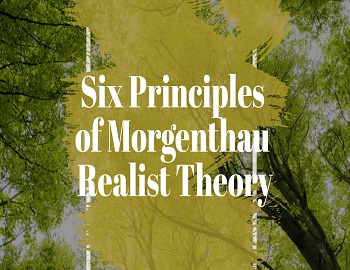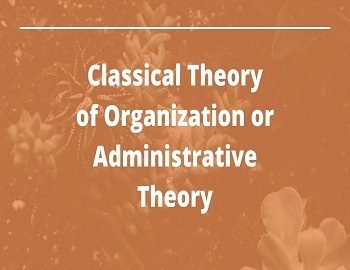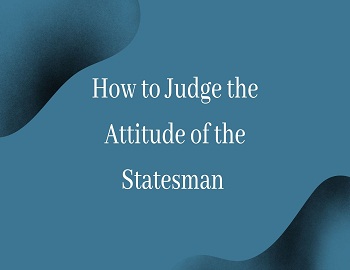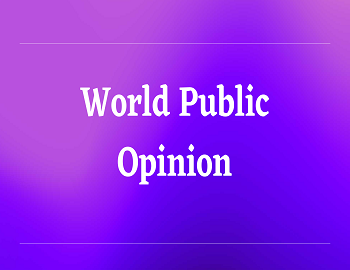Table of Contents
Morgenthau Realist Theory:
Politics is Governed by Objective Laws:
The first principle of Morgenthau’s theory is that politics is governed by objective laws that are based on human nature and psychology. Society or political system cannot be improved without understanding these laws. Moreover, these laws cannot be surpassed as this will only lead to utter failure. With the help of such a theory based on human nature and psychology, we can distinguish between truth and opinion i.e. what is based on reason and evidence and what is merely wishful thinking. Or in other words, we can say that by developing a political theory based on human psychology and reason, we can better understand political phenomena by distinguishing those from mere prejudices.
The theory also believes that human nature is very much stable. Hence the theory does not believe in the necessity of novelty nor does it believe that old age is a defect. Rather it believes that old age is sound and good.
The theory, however, should pass two tests, one of reason and another of experience. And realism consists of ascertaining facts and giving them meaning through reason. Therefore, to understand the foreign policy of statesmen we should examine not only the circumstances but also the possible ways which they might prefer to choose under such circumstances.
National Interest Defined in Terms of Power:
Secondly, the main characteristic of international politics that also enables us to distinguish it from other social sciences is the concept of national interest which Prof. Morgenthau defines in terms of power. It helps us a lot to understand the events of the political scene. As such we assume that all statemen always think and act only to fulfil their interest by achieving power. Thus Prof. Morgenthau believes that the defence of national interest is the essence of any foreign policy.
The theory of international politics avoids two fallacies namely the concern with motives and the concern with ideological preference. If we guide our study to the motives of statesmen to find out certain clues for their foreign policy, we shall only land in the soup. For a majority of statesmen clad their policies in moral or religious clothes. Thus to understand the foreign policy of statesmen, we should not look at his motives, but at his actual ability to bring them into action. Prof. Morgenthau observes, “political theory must judge the political qualities of intellect, will and action”.
It is true that some personal element is bound to creep into the policy of a statemen especially when one has to care for the voice of the people. But a true theory of international politics must point out the rational points without caring for the contingent deviations which often creep in. It should not be a point against this theory that it fails to cope with the achievability of aim. The aim of realism is to present rational theory and not an indiscriminate description of political study.
Interest Cannot be Fixed for all Times:
No doubt interest defined in terms of power is the key concept of political realism; its meaning cannot be determined or fixed for all times. Prof. Morgenthau believes that the environment plays the most significant role in shaping the interests that determine political action. Thus the concept of power according to Morgenthau must be adopted to the changing circumstances. Prof. Morgenthau holds that the present world is to be transformed into larger units of a distinct character. He further holds that this transformation will be achieved by the manipulation of the perennial forces which are already in existence.
Moral Principles cannot be applied to State’s Action:
Political realism suggests that universal moral principles cannot be applied to a state’s action in the abstract universal formulations but that they must be changed according to concrete circumstances of time and place. Realism believes that states are not expected to observe the same standards of morality as individuals. The individual may say for himself, “Let justice be done, even if the world perishes” but the state has no right to say so. The individual may sacrifice himself in defence of moral principles but the state has no right to sacrifice their liberty for moral principles. Realism also holds that prudence is the supreme virtue in politics; without prudence, there cannot be any political morality”.
No Identification between Moral Aspirations of a Nation and Universal Moral Laws:
Political realism, according to Prof. Morgenthau, refuses to accept any sort of identification between the moral aspiration of a nation and the moral laws that govern the universe. Realism considers all nations as political actors pursuing their national interests defined in terms of power. The concept of interest, defined in terms of power, saves the nation from political folly and moral excess. It is so because all nations judge other nations as seeking their national interest. As such, all nations pursue theirs policies that respect the interest of other nations while promoting and protecting their own interests.
Political Sphere is Autonomous:
Lastly, political realism stresses that the political sphere is just as autonomous as the respective spheres of the economist, or the lawyer or the moralist. It thinks in terms of interest defined as power, as the economist thinks in terms of utility; the lawyer, in terms of conformity of action with legal rules; the moralist in terms of conformity of action with moral principles. Political realism is very much conscious about the existence and relevance of non-political standards of thought but it puts all these standards in subordination to the standards of politics. As such it parts company with legalistic, moralistic and other schools of thought because they impose non-political standards of thought on the political sphere.









Comments (No)